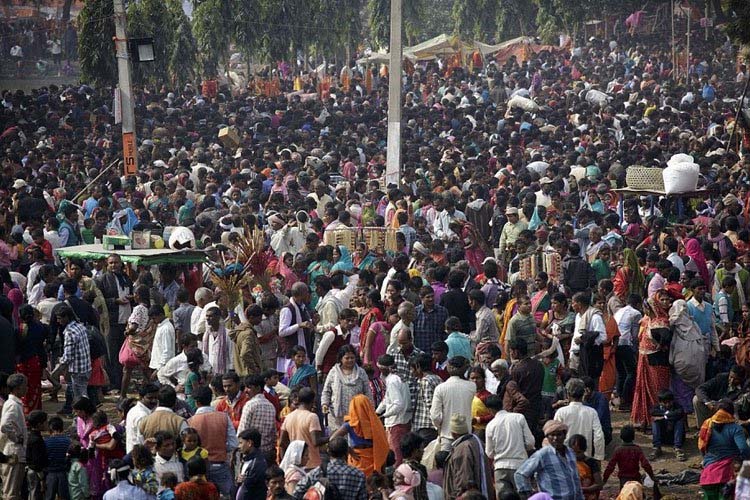Nepal: Despite a 2019 Supreme Court ruling that outlawed animal sacrifice, the biggest event is set to take place at a temple in southern Nepal, even as human rights groups in both Nepal and India are staging widespread protests demanding a “bloodless Gadhimai”. The Gadhimai mela or festival, held at the famous Gadhimai temple in Bara district, began on Monday – inaugurated by Vice President Ram Sahay Yadav – but the main animal sacrifice event will be held on December 8 and 9.
On Sunday, the celebrations will formally begin with Panchbali, in which five animals and birds – a rat, a buffalo, a goat, a duck and a pigeon – will be sacrificed at the fair that attracts devotees and tourists from both Nepal and India.
This year, at least 460 buffaloes have been brought in from Indian states through illegal channels so far despite the restrictions imposed by Indian authorities, said activist Sneha Shrestha, president of Sneha Care, a non-profit working for animal welfare. Located in Mahagadhimai municipality – about 25 km from Raxaul in India, a major entry point into Nepal from Bihar – the deity at the Gadhimai temple, built in the 17th century, is believed to be a form of Bhagawati or Kali. People come here to seek their wish and when it is fulfilled, they return to offer animal sacrifices as per tradition.
Rights groups in both Nepal and India have intensified their campaign against animal sacrifice, as government officials and devotees continue preparations for the mega event. Animal rights activist and former minister in the Indian government Maneka Gandhi had written a letter to Vice President Yadav urging him not to attend the inauguration ceremony and respect the 2019 verdict of Nepal’s Supreme Court that deemed animal sacrifice inappropriate.
However, despite the Supreme Court ruling that year, officials said 5,600 buffaloes and hundreds of goats, pigs, chickens and pigeons were sacrificed at the Gadhimai fair despite anti-sacrifice campaigns by various national and international groups. Humane Society International (HSI) India, a rights group, said various animal rights groups in Nepal and India have been working since 2014 to stop animal sacrifice at Gadhimai. “With persistent efforts, the horrific animal sacrifice has reduced from an estimated 5,00,000 animals killed in 2009 to around 2,50,000 in 2014 and 2019,” HSI India said in a statement.
According to local reports, more than 70 percent of the animals kept for sacrifice are brought from India by illegally crossing the border. Various rights groups have deployed their activists at border checkpoints to help authorities seize such animals, some of which are less than a month old. HSI said it has deployed a team at the Nepal-India border to assist the border police in curbing illegal cross-border transportation of animals.
People for the Ethical Treatment of Animals (PETA) India has written to Prime Minister KP Sharma Oli urging him to take decisive action to stop the massacre of thousands of animals at Gadhimai. “The incident has received widespread international criticism for its inhumane practices, serious public health risks, and damage to the environment,” PETA India’s statement said. The organisation has also written to Bihar Chief Minister Nitish Kumar urging him to increase vigilance at the border to prevent Indian animals from crossing into Nepal.
With the campaign gaining momentum this year, activists are claiming that a lesser number of animals are expected to be sacrificed.
Shrestha said, “This year the number of animals brought for sacrifice will be less, which includes about 2,000 buffaloes.” He said that on the initiative of various animal rights groups, a grand peace march was organised on November 30 at Gadhimai on Tuesday with the slogan “Bloodless Gadhimai”. “Instead of discouraging the wrong practice of animal sacrifice, the Nepal government is promoting such events,” he told PTI. Apart from the inauguration by the vice president, Deputy Prime Minister and Urban Development Minister Prakash Man Singh attended the event on Tuesday, while Home Minister Ramesh Lekhak attended it on Wednesday. Bara’s Assistant Chief District Administration Officer Chhabi Raman Bhattarai said: “We cannot control it (animal sacrifice) as it depends on the faith of the people. We have arranged for quarantine to prevent underage and sick animals from entering (Nepal).” He said a large number of Indian tourists also visit the temple on the occasion. Meanwhile, under pressure from animal rights groups, temple authorities have suggested that devotees donate money for the renovation of the temple premises instead of bringing animals for sacrifice. They have urged devotees to donate money for conservation work, for example Rs 8,000 for bringing a buffalo, Rs 4,000 for bringing a goat and Rs 300 for bringing a pigeon.
